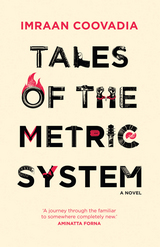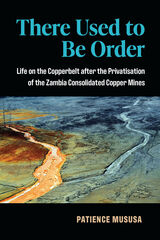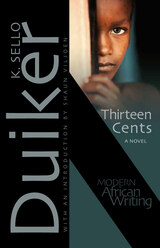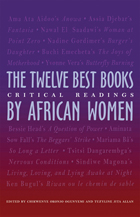110 books about African Studies and 7
start with T
110 books about African Studies and 7
110 books about African Studies
7 start with T start with T
7 start with T start with T

Tales of the Metric System
A Novel
Imraan Coovadia
Ohio University Press, 2016
In Tales of the Metric System, Coovadia explores a turbulent South Africa from 1970 into the present. He takes his home country’s transition from imperial to metric measurements as his catalyst, holding South Africa up and examining it from the diverse perspectives of his many characters. An elite white housewife married to a radical intellectual; a rock guitarist; the same guitarist’s granddaughter thirty years later; a teenaged boy at the mercy of mob justice—each story takes place over one of ten days across the decades, and each protagonist has his own stakes, her own moment in time, but each is equally caught in the eddies of change. Tales of the Metric System is clear eyed, harrowing, and daring.
[more]

Tear Down the Walls
White Radicalism and Black Power in 1960s Rock
Patrick Burke
University of Chicago Press, 2021
From the earliest days of rock and roll, white artists regularly achieved fame, wealth, and success that eluded the Black artists whose work had preceded and inspired them. This dynamic continued into the 1960s, even as the music and its fans grew to be more engaged with political issues regarding race. In Tear Down the Walls, Patrick Burke tells the story of white American and British rock musicians’ engagement with Black Power politics and African American music during the volatile years of 1968 and 1969. The book sheds new light on a significant but overlooked facet of 1960s rock—white musicians and audiences casting themselves as political revolutionaries by enacting a romanticized vision of African American identity. These artists’ attempts to cast themselves as revolutionary were often naïve, misguided, or arrogant, but they could also reflect genuine interest in African American music and culture and sincere investment in anti-racist politics. White musicians such as those in popular rock groups Jefferson Airplane, the Rolling Stones, and the MC5, fascinated with Black performance and rhetoric, simultaneously perpetuated a long history of racial appropriation and misrepresentation and made thoughtful, self-aware attempts to respectfully present African American music in forms that white leftists found politically relevant. In Tear Down the Walls Patrick Burke neither condemns white rock musicians as inauthentic nor elevates them as revolutionary. The result is a fresh look at 1960s rock that provides new insight into how popular music both reflects and informs our ideas about race and how white musicians and activists can engage meaningfully with Black political movements.
[more]

There Used to Be Order
Life on the Copperbelt after the Privatisation of the Zambia Consolidated Copper Mines
Patience Mususa
University of Michigan Press, 2021
In There Used to Be Order, Patience Mususa considers social change in the Copperbelt region of Zambia following the re-privatization of the large state mining conglomerate, the Zambia Consolidated Copper Mines (ZCCM), in the mid-1990s. As the copper mines were Zambia’s most important economic asset, the sale of ZCCM was considered a major loss to the country. More crucially, privatization marked the end of a way of life for mine employees and mining communities. Based on three years of ethnographic field research, this book examines life for those living in difficult economic circumstances, and considers the tension between the life they live and the nature of an “extractive area.” This account, unusual in its examination of middle-income decline in Africa, directs us to think of the Copperbelt not only as an extractive locale for copper whose activities are affected by the market, but also as a place where the residents’ engagement with the harsh reality of losing jobs and struggling to earn a living after the withdrawal of welfare is simultaneously changing both the material and social character of the place. Drawing on phenomenological approaches, the book develops a theoretical model of “trying,” which accounts for both Copperbelt residents’ aspirations and efforts.
[more]

Thirteen Cents
A Novel
K. Sello Duiker
Ohio University Press, 2013
Every city has an unspoken side. Cape Town, between the picture postcard mountain and sea, has its own shadow: a place of dislocation and uncertainty, dependence and desperation, destruction and survival, gangsters, pimps, pedophiles, hunger, hope, and moments of happiness. Living in this shadow is Azure, a thirteen-year-old who makes his living on the streets, a black teenager sought out by white men, beholden to gang leaders but determined to create some measure of independence in this dangerous world. Thirteen Cents is an extraordinary and unsparing account of a coming of age in Cape Town. Reminiscent of some of the greatest child narrators in literature, Azure’s voice will stay with the reader long after this short novel is finished. Based on personal experiences, Thirteen Cents is Duiker’s debut novel, originally published in 2000. This first edition to be published outside South Africa includes an introduction by Shaun Viljoen and a special glossary of South African words and phrases from the text translated into English.
[more]

Thomas Sankara
An African Revolutionary
Ernest Harsch
Ohio University Press, 2014
Thomas Sankara, often called the African Che Guevara, was president of Burkina Faso, one of the poorest countries in Africa, until his assassination during the military coup that brought down his government. Although his tenure in office was relatively short, Sankara left an indelible mark on his country’s history and development. An avowed Marxist, he outspokenly asserted his country’s independence from France and other Western powers while at the same time seeking to build a genuine pan-African unity. Ernest Harsch traces Sankara’s life from his student days to his recruitment into the military, early political awakening, and increasing dismay with his country’s extreme poverty and political corruption. As he rose to higher leadership positions, he used those offices to mobilize people for change and to counter the influence of the old, corrupt elites. Sankara and his colleagues initiated economic and social policies that shifted away from dependence on foreign aid and toward a greater use of the country’s own resources to build schools, health clinics, and public works. Although Sankara’s sweeping vision and practical reforms won him admirers both in Burkina Faso and across Africa, a combination of domestic opposition groups and factions within his own government and the army finally led to his assassination in 1987. This is the first English-language book to tell the story of Sankara’s life and struggles, drawing on the author’s extensive firsthand research and reporting on Burkina Faso, including interviews with the late leader. Decades after his death, Sankara remains an inspiration to young people throughout Africa for his integrity, idealism, and dedication to independence and self-determination.
[more]

Transforming Vòdún
Musical Change and Postcolonial Healing in Benin's Jazz and Brass Band Music
Sarah Politz
University of Michigan Press, 2023
Transforming Vòdún examines how musicians from the West African Republic of Benin transform Benin’s cultural traditions, especially the ancestral spiritual practice of vòdún and its musical repertoires, as part of the process of healing postcolonial trauma through music and ritual. Based on fieldwork in Benin, France, and New York City, Sarah Politz uses historical ethnography, music analysis, and participant observation to examine three case studies of brass band and jazz musicians from Benin. The multi-sited nature of this study highlights the importance of mobility, and diasporic connections in musicians’ professional lives, while grounding these connections in the particularities of the African continent, its histories, its people, and its present.
[more]

The Twelve Best Books by African Women
Critical Readings
Chikwenye Okonjo Ogunyemi
Ohio University Press, 2009
In 2002, at the annual Zimbabwe International Book Fair, twelve literary books by African women were included for the first time in the category of “Africa’s 100 Best Books of the Twentieth Century.” This was an important but belated affirmation of women writers on the continent and a first step toward establishing a recognized canon of African women’s literature.
The Twelve Best Books by African Women is a collection of critical essays on eleven works of fiction and one play. The titles by African women that were included in the list of “Africa’s 100 Best Books of the Twentieth Century” are: Anowa, Ama Ata Aidoo (1970); A Question of Power, Bessie Head (1974); Woman at Point Zero, Nawal El Saadawi (1975); The Beggars’ Strike, Aminata Sow Fall (1979); Burger’s Daughter, Nadine Gordimer (1979); The Joys of Motherhood, Buchi Emesheta (1979); So Long a Letter, Mariama Bâ (1980); Fantasia: An Algerian Cavalcade, Assia Djebar (1983); Nervous Conditions, Tsitsi Dangarembga (1988); Living, Loving and Lying Awake at Night, Sindiwe Magona (1991); Butterfly Burning, Yvonne Vera (1998); Riwan ou le chemin de sable, Ken Bugul (1999).
This collection of original essays recognizes the gesture of inclusion as an important shift in consciousness and creates a fresh awareness of the literary works by African women writers. Each essay offers a penetrating analysis of individual texts and opens up a fresh perspective that allows scholars and students alike to explore new dimensions of these writers’ work.
The Twelve Best Books by African Women is a collection of critical essays on eleven works of fiction and one play. The titles by African women that were included in the list of “Africa’s 100 Best Books of the Twentieth Century” are: Anowa, Ama Ata Aidoo (1970); A Question of Power, Bessie Head (1974); Woman at Point Zero, Nawal El Saadawi (1975); The Beggars’ Strike, Aminata Sow Fall (1979); Burger’s Daughter, Nadine Gordimer (1979); The Joys of Motherhood, Buchi Emesheta (1979); So Long a Letter, Mariama Bâ (1980); Fantasia: An Algerian Cavalcade, Assia Djebar (1983); Nervous Conditions, Tsitsi Dangarembga (1988); Living, Loving and Lying Awake at Night, Sindiwe Magona (1991); Butterfly Burning, Yvonne Vera (1998); Riwan ou le chemin de sable, Ken Bugul (1999).
This collection of original essays recognizes the gesture of inclusion as an important shift in consciousness and creates a fresh awareness of the literary works by African women writers. Each essay offers a penetrating analysis of individual texts and opens up a fresh perspective that allows scholars and students alike to explore new dimensions of these writers’ work.
[more]
READERS
Browse our collection.
PUBLISHERS
See BiblioVault's publisher services.
STUDENT SERVICES
Files for college accessibility offices.
UChicago Accessibility Resources
home | accessibility | search | about | contact us
BiblioVault ® 2001 - 2024
The University of Chicago Press









